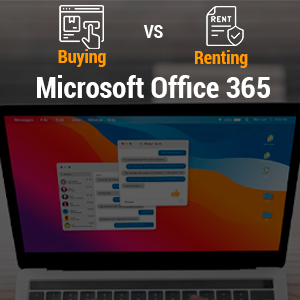
Modern organizations utilize technology applications and solutions such as Microsoft Office 365 to enhance productivity, collaboration, and security measures regardless of size or type. Microsoft Word, Excel, or Outlook applications are vital for any company's work processes. As for Microsoft Office, many users decide between purchasing or renting it. To what extent can one option be deemed superior, depending on your company's requirements? This blog will compare the advantages and disadvantages of purchasing Office 365 and renting to facilitate an informed decision based on a company's needs.
The previous system, where users would purchase a software product and own it for a lifetime through the acquisition of a license, has been replaced by a cloud service model. In this new model, users pay for a subscription on a monthly or yearly basis. This evolution comes with different cost models, update frequencies, and available support aspects, substantially defining business operations.
In this blog, we will discover these differences, evaluate the advantages and disadvantages of each approach, and offer specific suggestions on when and how to pursue each option. We can begin by examining what renting or buying Microsoft Office 365 looks like in the current software environment.
What does it mean to purchase Microsoft Office 365?
Purchasing software entailed getting a legal license to use it. The subscription model entails paying a one-time fee to gain a perpetual license to use the software. Microsoft 365 is a subscription-based service for Office apps such as Word, Excel, PowerPoint, Outlook, and others, depending on the version, and it comes with extra features.
Pros of Buying Office 365:
One-Time Payment: Paid for Office 365 could be different because you make a one-time payment up-front. It may be more economical in the long run since no regular charges are involved.
Ownership: You acquire the licenses once you buy them and can use them if the software runs with your systems. It can give business entities that need money and certainty in an uncertain world.
No Subscription Pressure: There won't be any pressure to continue paying monthly or yearly subscriptions to use the utilities.
No Forced Update: Updates will not be made through the Horizontal Marketing System, and here, users do not need to update at inconvenient times.
Cons of Buying Office 365
Upfront Cost: The overall Cost is marginally lower; it is pressurizing for small businesses as the amount paid is in one go.
Limited Upgrades: Purchasing a perpetual license means you are bound to use the specific version of Office 365. If Microsoft adds a new feature in later versions, you have to upgrade your copy and pay for it again to have access to it.
Less Flexibility: If your business requirements vary, you can only upgrade to another version of Office if you get another license. This lack of flexibility can be disadvantageous to growing businesses most of the time.
No Cloud-Based Features: It does not have all the features of a cloud-based collaborative application such as OneDrive, which is available in a perpetual subscription.
Read More Blog: Know the Key Difference Between Microsoft 365 vs Microsoft Office
What Does It Mean to Rent Microsoft Office 365
Renting Office 365 or having access to Microsoft 365 means paying for a monthly or annual subscription to the software. This subscription model provides another variant of Office 365 with more update frequency, storage on the cloud, and improved collaborative features. Many people consider Microsoft 365 an indispensable tool for staying connected and constantly updating with new functions.
Pros of Renting Office 365:
1. Low Upfront Cost: This option exempts business owners from extensive capital investment and allows them to pay small installments over a certain period. It is desirable for start-ups or organizations with lower cash flow.
2. Always Updated: If you have a subscription, you will automatically receive updates and new features as they are released in the market. This way, you will be assured that your business is updated with the latest technology.
3. Cloud Access: Microsoft has provided Office 365, which includes OneDrive for obtaining cloud space, and Teams, where employees can work and share their documents in real-time.
4. Flexible Plans: The subscription options, such as basic office applications or advanced business solutions, depend on the business's needs. It is also easy to update the users when expanding or reducing your business.
5. Enterprise-Level Support: Customer support is typically an expected part of a subscription, especially when the business faces technical issues.
Cons of Renting Office 365:
1. Recurring Payments: For instance, though the amount might seem reasonable given every month, it may accumulate over some time and, therefore, make renting more costly in the long run.
2. No Ownership: Since you are leasing it, you never actually own the product, which is what you're doing here. If you fail to continue with the payment, you will be locked out of the software and all its functions.
3. Continuous Updates: Being updated is usually helpful. However, when new updates are provided frequently, they may disrupt the workflow, especially when compatibility is an issue or new tools are added.
4. Dependency on Internet Access: Some of the options under the subscription depend on the Internet; therefore, restricted Internet access may slow down work.
Cost Comparison: Comparing Office 365 Renting vs. Buying
So, let's discuss how the costs vary if one buys a license for Microsoft Office 365 and compare them to the cost of renting it in the long run.
Buying Office 365: Suppose you will pay $250 per license for Office Home & Business 2021. If you use the software for five years, you spend $50 per year.
Renting Office 365: Conversely, Microsoft 365 Business Standard is available at $12 or around that price. To put it clearly, it costs 50 dollars per user per month, which is equal to 150 dollars per year for each user. So, in five years, it will be $750 per person.
Of course, the initial investment in buying is higher than renting, but renting could become more costly as time passes. However, one can balance the cost through the features added with the subscription, including cloud services, regular updates, and assistance.
Which Option Is Best for Your Business?
In deciding whether to buy or rent Office 365 for a company, key factors should consider the organization's requirements, size, and economic capacity. Small businesses or start-up organizations may consider renting more favorably owing to the little or no cash outlay, the flexibility of the space, and current cloud-based applications that encourage remote working.
Larger organizations with more capital may opt for a license if they are more concerned with ownership, saving for future use instead of with frequent updates or cloud services.
Suppose your business requires frequent updates, such as new features, data storage in the cloud, and simultaneous editing from different people. In that case, your only option might be to rent Microsoft Office 365 through a subscription. However, if one wants to reduce the overall costs in the long run and wants the program installed on the computer, then purchase is more suitable.
Read More Blog : How to Successfully Migrate Your Office 365 Account Back to Microsoft
Conclusion
It comes to your business's function and your company's future Microsoft Office 365 requirements. Purchasing entails a single expenditure and ownership, while renting involves frequent gradation and remote access, among other pros. Decision-makers should consider budget workforce size and the degree of collaboration required when choosing their course.
That is why, at B&L PC Solutions, we expect our clients to make the right decisions concerning using additional software. If you are considering purchasing or leasing Office 365, our team is ready to discuss the best variant for your enterprise. We would love to discuss your Microsoft Office 365 requirements and find ways to manage your IT Services Company Long Island company's systems better.
Tags: Buying vs. Renting Microsoft Office 365, Microsoft Office 365





